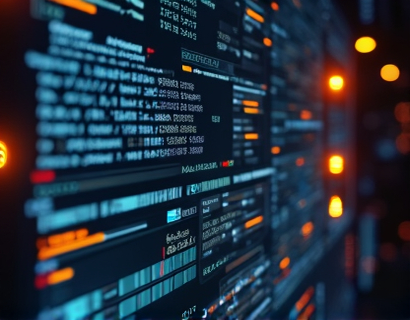The Convergence of AI and Crypto: Pioneering Financial Innovation in the Digital Age
The intersection of artificial intelligence and cryptocurrency is giving birth to a new era of financial innovation. This convergence is not just a technological curiosity but a transformative force that is reshaping the landscape of digital finance. As we delve into this topic, it's essential to understand the foundational technologies driving this change and their implications for the future of financial services.
Artificial intelligence, with its ability to process vast amounts of data and learn from patterns, is revolutionizing how financial institutions operate. In the context of cryptocurrency, AI brings a level of sophistication and efficiency that was previously unimaginable. This article will explore the various ways AI is being integrated into the crypto ecosystem, from enhancing security and transaction processing to enabling more intelligent and personalized financial services.
Enhancing Security with AI
One of the most significant challenges in the crypto space is security. Cryptocurrencies, by their nature, are decentralized and often rely on blockchain technology to ensure transparency and immutability. However, the very decentralization that provides security can also introduce vulnerabilities. AI can play a crucial role in mitigating these risks.
Machine learning algorithms can analyze transaction patterns and detect anomalies that may indicate fraudulent activity. By continuously learning from new data, these systems become more adept at identifying and preventing cyber threats. For instance, AI-powered security solutions can monitor blockchain networks in real-time, identifying suspicious patterns and alerting users or administrators to potential breaches. This proactive approach to security is a game-changer for crypto users and exchanges alike.
Moreover, AI can enhance the security of private keys and wallet management. Traditional methods of storing private keys, such as hardware wallets, can be compromised through various means. AI-driven solutions can offer more robust encryption methods and biometric authentication, ensuring that only the rightful owner can access their funds. This not only protects against external threats but also reduces the risk of human error, which is a common cause of security breaches.
Optimizing Transaction Processing
Transaction processing is another area where AI is making significant strides. Blockchain transactions, while secure, can be slow and expensive, especially during periods of high network congestion. AI can optimize the transaction process by predicting network conditions and dynamically adjusting transaction parameters to ensure faster and cheaper transfers.
Smart contracts, which are self-executing contracts with the terms directly written into code, can benefit greatly from AI optimization. AI algorithms can analyze the conditions and outcomes of smart contracts, suggesting improvements and ensuring that they operate efficiently. This can lead to more reliable and cost-effective execution of agreements, reducing the need for intermediaries and lowering transaction costs.
Additionally, AI can enhance the scalability of blockchain networks. By predicting and managing network load, AI systems can help prevent congestion and ensure smooth transaction processing. This is particularly important for cryptocurrencies aiming to become mainstream payment solutions, as they need to handle a high volume of transactions without compromising on speed or security.
Personalized Financial Services
The integration of AI into the crypto space is not just about security and efficiency; it's also about creating personalized financial experiences. AI-driven platforms can analyze user data to provide tailored recommendations, investment strategies, and financial insights. This level of personalization is transforming the way individuals interact with financial services.
For example, AI can analyze a user's transaction history, spending patterns, and risk tolerance to suggest optimal investment portfolios. This is particularly valuable in the crypto market, where volatility and complexity can make decision-making challenging. By leveraging AI, users can gain deeper insights and make more informed decisions, potentially leading to better investment outcomes.
Furthermore, AI can facilitate the creation of decentralized finance (DeFi) applications that offer traditional financial services in a decentralized manner. AI-powered DeFi platforms can provide personalized lending, borrowing, and trading services, all while maintaining the transparency and security of blockchain technology. This democratizes access to financial services, making them available to a broader audience, including those in underbanked regions.
Predictive Analytics and Market Insights
Predictive analytics is another area where AI is making a significant impact in the crypto space. By analyzing historical data and real-time market conditions, AI algorithms can forecast price movements and identify trends that human analysts might miss. This can be invaluable for traders and investors looking to capitalize on market opportunities.
AI-driven analytics tools can process vast amounts of data from various sources, including social media, news articles, and market reports, to gauge sentiment and predict price fluctuations. This comprehensive approach to market analysis can provide a competitive edge, helping users make more accurate and timely decisions.
Moreover, AI can help identify emerging trends and potential disruptors in the crypto market. By monitoring the development of new technologies and projects, AI can alert users to opportunities before they become widely recognized. This proactive approach to market insight is a powerful tool for both individual traders and institutional investors.
Challenges and Considerations
While the integration of AI and crypto offers numerous benefits, it also comes with its own set of challenges and considerations. One of the primary concerns is the regulatory landscape. As AI and crypto continue to evolve, regulators are grappling with how to oversee these technologies to prevent misuse and ensure consumer protection. Navigating this complex regulatory environment is crucial for the sustainable growth of AI-enhanced crypto solutions.
Another challenge is the ethical use of AI. Ensuring that AI systems are transparent, fair, and free from bias is essential. The crypto community must prioritize ethical AI practices to maintain trust and credibility. This includes addressing issues such as data privacy, algorithmic transparency, and the potential for AI to exacerbate existing inequalities.
Technical challenges also exist. Integrating AI into blockchain networks requires significant computational power and sophisticated algorithms. Ensuring that these systems are scalable, efficient, and secure is an ongoing area of research and development. Collaboration between AI experts and blockchain developers is essential to overcome these technical hurdles.
The Future of Finance
The convergence of AI and crypto is not just a trend but a fundamental shift in how we think about financial services. As these technologies continue to mature, we can expect to see even more innovative applications and use cases. The future of finance is likely to be characterized by increased automation, personalization, and decentralization, all driven by the synergy between AI and blockchain.
For tech enthusiasts and innovators, this is an exciting time to be involved in the crypto space. The potential for creating groundbreaking solutions that enhance financial inclusion, security, and efficiency is immense. By embracing the power of AI, the crypto community can continue to push the boundaries of what is possible, shaping a more inclusive and resilient financial future.
In conclusion, the integration of AI and crypto is a pivotal development in the digital age. It offers a pathway to more secure, efficient, and personalized financial services, opening up new opportunities for users and developers alike. As we move forward, it's crucial to address the challenges and ethical considerations while harnessing the transformative potential of this powerful combination.










































